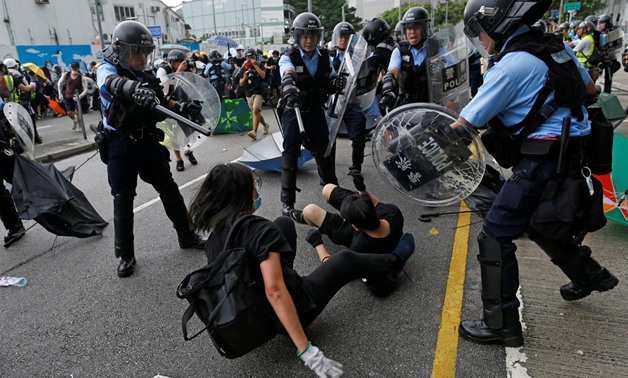
Riot police try to disperse protesters near a flag raising ceremony for the anniversary of Hong Kong handover to China in Hong Kong, China July 1, 2019. REUTERS/Thomas Peter
HONG KONG (Reuters) - Protesters tried to storm Hong Kong’s legislature on the anniversary of the city’s return to Chinese rule on Monday, using a metal trolley and poles to smash windows amid anger over planned legislation that would allow extraditions to China.
Around 100 riot police in helmets and carrying batons stood behind the shattered glass as a small group of protesters rammed the windows ahead of a planned rally to mark the former British colony’s 1997 handover.
Tension was high as police held up a red banner warning protesters to stop charging or they would use force.
They had earlier raced towards protesters, beating some with batons as they fell to the ground, and used pepper spray to try to disperse crowds gathered near where officials were preparing a ceremony to mark the handover.
“In the past few years, people have been getting more active, because they found the peaceful way is not working,” said a 24-year-old protester surnamed Chen.
More than a million people have taken to the streets at times over the past three weeks to vent their anger and frustration at Hong Kong’s Beijing-backed leader, Carrie Lam, posing the greatest popular challenge to Chinese leader Xi Jinping since he came to power in 2012.
Opponents of the now-suspended extradition bill, which would allow people to be sent to mainland China for trial in courts controlled by the Communist Party, fear it is a threat to Hong Kong’s much-cherished rule of law and are demanding it be scrapped and Lam step down.
Hong Kong returned to China under a “one country, two systems” formula that allows freedoms not enjoyed in mainland China, including freedom to protest and a much-cherished independent judiciary.
Beijing denies interfering but, for many Hong Kong residents, the extradition bill is the latest step in a relentless march towards mainland control.
Police fired pepper spray to disperse some demonstrators, mostly black-clad students wearing hard hats and face masks and carrying umbrellas, while others had cling film wrapped around their arms to protect their skin in the event of tear gas.
Thousands were starting to gather in the city’s Victoria Park in sweltering temperatures of around 33 degrees Celsius (91.4°F) for an annual rally that organizers expected to draw large crowds amid anger over the extradition bill.
The protesters once again paralyzed parts of the financial hub as they occupied roads after blocking them off with metal barriers and wooden planks.
Weeks of unrest forced nervous authorities to deploy a massive security blanket around the waterfront Convention and Exhibition Center, the venue for the flag-raising ceremony.
A tired-looking Lam appeared in public for the first time in nearly two weeks to attend the ceremony, flanked by her husband and former Hong Kong leader Tung Chee-hwa.
Lam said the government needed to change its style of governance and pledged to do more for young people.
“The incident that happened in recent months has led to controversies and disputes between the public and the government. This has made me fully realize that I, as a politician, have to remind myself all the time of the need to grasp public sentiments accurately,” Lam said.
Beijing’s grip over Hong Kong has intensified markedly since Xi took power and after pro-democracy street protests that gripped the city in 2014 but failed to wrestle concessions from China.
Slideshow (21 Images)
The extradition bill has sent jitters across all sectors of Hong Kong in an unprecedented backlash against the government.
Tensions spiraled on June 12 when police fired rubber bullets and tear gas at anti-extradition protesters near the heart of the city, sending plumes of smoke billowing among some of the world’s tallest skyscrapers.
The uproar over the bill has reignited a protest movement that had lost steam after the 2014 demonstrations failed to force concessions from Beijing and led to the arrests of hundreds of activists.
Activists raised a black bauhinia flag to half mast outside the Legislative Council building before the rally and turned Hong Kong’s official flag, featuring a white bauhinia flower on a red background, upside down.
The demonstrations have brought havoc, forcing the closure of government offices on several occasions and triggering chaos as protesters blocked roads and besieged police headquarters.
The turmoil comes at a delicate time for Beijing, which is grappling with a trade dispute with the United States, a faltering economy and tensions in the South China Sea.
Lam said after suspending the bill she had heard the people “loud and clear”. However, she stopped short of activists’ demands to scrap it altogether.
Activists are also demanding the government drop charges against those arrested during the protests, charge police with what they describe as excessive use of force and stop referring to the demonstrations as a riot, a term that can bring a heavier jail sentence.
Opponents of the extradition bill fear it would put them at the mercy of China’s justice system, where human rights are not guaranteed.
Beyond the public outcry, the extradition bill has spooked some of Hong Kong’s tycoons into starting to move their personal wealth offshore, according to financial advisers, bankers and lawyers familiar with the details.


Comments
Leave a Comment